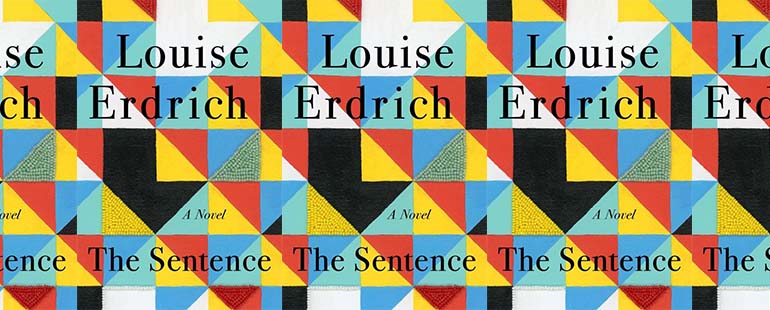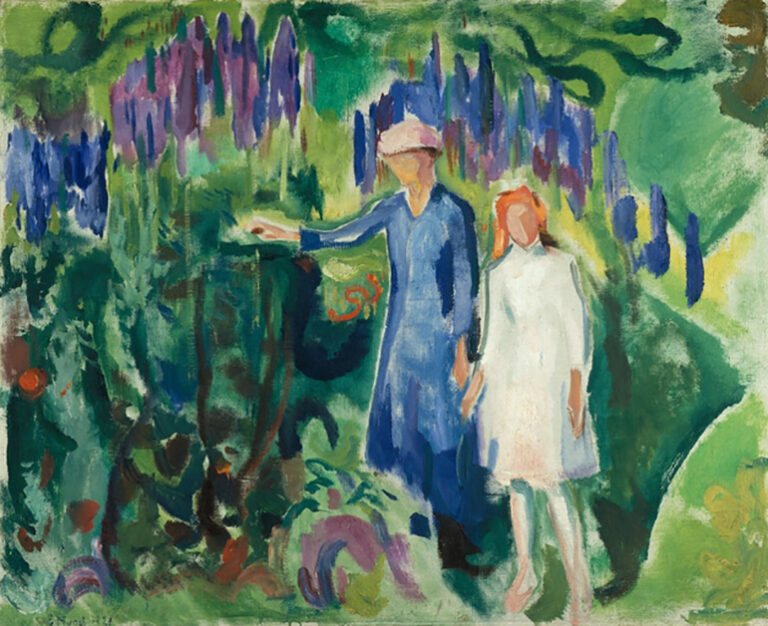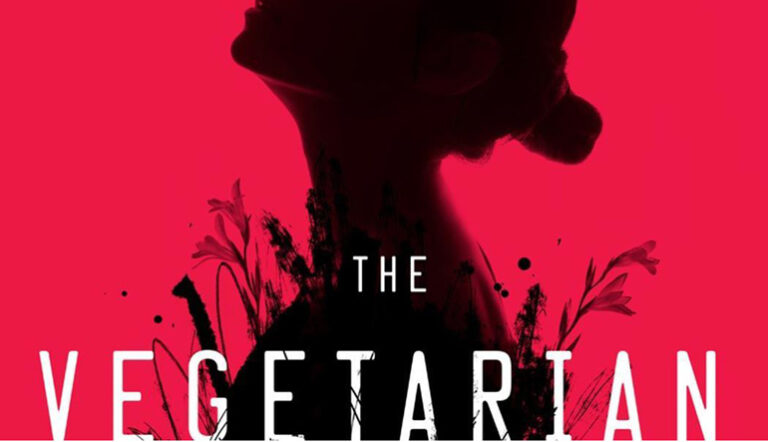The Power of Sentences

Midway through Louise Erdrich’s novel The Sentence, published in November, its protagonist Tookie has a conversation with the owner of the Minneapolis bookstore where she works about how a book killed one of their devoted customers. The bookshop owner, Louise, doesn’t quite catch Tookie’s drift and resorts to a literary platitude: “Books aren’t meant to be safe. Sadly, or heroically, depending on the way you look at it, books do kill people.” But Tookie isn’t satisfied. She pushes still further: “What I’m trying to say is that a certain sentence of the book—a written sentence, a very, very powerful sentence—killed Flora.” Louise is quiet for a while and finally replies: “I wish I could write a sentence like that.”
The characters’ exchange is a snapshot of the novel’s central themes of language and literature, their power for both harm and healing. It’s also a snapshot of the novel’s uncanny metatextual resonance. The Sentence hovers in a realm of magic realism heavily laced with contemporary verisimilitude. Tookie works at a bookshop that notably resembles Louise Erdrich’s own Birchbark Books, from its location and its repurposed confessional booth to its focus on Indigenous literatures. Similarly, while the novel begins with vintage Erdrich hijinks—Tookie is incarcerated in her 30s for stealing and transporting a dead body for a friend without realizing the body had cocaine taped in its armpits—in its second half the novel slides into the grief and uncertainty of 2020, with its threatening “novel coronavirus,” the lynching of George Floyd, and the protests in the bookstore’s neighborhood that followed his death. During all these events, Tookie grapples with Flora’s haunting of the store and of herself more specifically. The result of all these real-world resonances is a persistent implicit commentary on the importance of words—and the communities forged by words—in the face of the traumas that haunt individual and collective lives.
Louise’s desire to write a sentence that can kill could be said to offer an unusually honest admission of a writer’s desire for a certain kind of verbal power. But the novel is full of powerful sentences: the judge’s sentence of 60 years for Tookie’s crime (commuted after ten); the sample sentences she finds when she looks up the word “sentence” in the dictionary a former teacher sends her in prison (“The door is open. Go!”); and the sentence in the handwritten book Tookie believes killed Flora, a journal of an Indigenous woman captured by white people and “sentenced to be white,” itself called The Sentence: An Indian Captivity, 1862-1883. At one point, one of Tookie’s coworkers comments that Indigenous people in general have, like the writer of the journal, “endured centuries of being erased and sentenced to live in a replacement culture.” Later, as they try to release Flora’s ghost from the store, the characters work to find “The Most Beautiful Sentence”—the section’s title—as part of a ritual to send her away.
The trope of haunting does similarly layered work. The book’s most literal haunting is of course by Flora, in life a “very persistent wannabe” obsessed with finding a connection to Indigenous community who moved from insisting she was an “Indian in a former life” to having “suddenly discovered a shadowy great-grandmother” in a photograph to cement her ancestral ties. After her death, Flora ultimately threatens to overtake Tookie’s very body, to occupy her Ojibwe flesh. But Tookie is also haunted by a trauma that Flora is wrapped up in, a reality her own coping mechanisms keep opaquely hidden from both Tookie and the novel’s readers until its final pages. Meanwhile, haunting accrues other significance. Tookie represents the colonial history of the land in these terms:
Like every state in our country, Minnesota began with blood dispossession and enslavement. Officers in the U.S. Army bought and sold enslaved people, including a married couple named Harriet Robinson and Dred Scott. Our history marks us. Sometimes I think our state’s beginning years haunt everything: the city’s attempts to graft progressive ideas onto its racist origins, the fact that we can’t undo history but are forced to either confront or repeat it.
Asema, one of the other bookstore workers, likewise inverts the colonial metaphor of haunting: “Think how white people believe their houses or yards or scenic overlooks are haunted by Indians, when it’s really the opposite. We’re haunted by settlers and their descendants.” Roland, a devoted Black bookstore customer, extends the metaphor still further, telling Tookie the whole city is literally haunted with redlining and other material practices of injustice. On a smaller scale, Tookie and her husband Pollux consider “the prez,” whom they refer to as “orangey” and mostly decide not to think about, a “haunting” sort of “ache in the brain.” Closer to home, a later section called “The Haunting of Pollux” recounts Pollux’s own haunting as a retired tribal police officer by “image after image” of people harmed by police brutality.
These myriad hauntings interweave structural and historical injustices like colonization and slavery with personal and contemporary struggles in the lives of Tookie, Pollux, and their family and friends as they protest and try to protect each other through the spring and summer of 2020. The hauntings writ large are inseparable from the personal hauntings, and the broader theme that one must confront history in order to avoid repeating it parallels the struggle both Tookie and Flora experience in their attempts to escape the painful truths of their own histories writ small. In her living years, Flora haunts the Indigenous bookstore in the metaphorical sense at least in part due to her apparent desire for settler absolution. Her longing to find an Indigenous ancestor aligns with a trend Eve Tuck and K. Wayne Yang describe in their essay “Decolonization is Not a Metaphor”: “Settlers locate or invent a long-lost ancestor who is rumored to have had ‘Indian blood,’ and use this claim to mark themselves as blameless in the attempted eradication of Indigenous peoples.” The sentence that Tookie believes killed Flora contains words that fully refuse this quest for purity: as we learn in the novel’s conclusion, it’s the sentence with Flora’s own name—and the name of the great-grandmother written on the back of her photograph—revealing that Flora’s namesake was not in fact Indigenous but instead a white settler woman notorious for imprisoning, abusing, sexually trafficking, and even murdering Indigenous women. The truth of Flora’s history is a literalization of the worst of colonial harms and confronted by this heritage, Flora gives up the ghost. She cannot come to terms with her true bloodline and its implications of settler responsibility.
Yet in life Flora did consistent material good: she “fostered Native teen runaways, raised money for a Native women’s refuge, worked in the community…. She showed up at every powwow and protest and gathering. She would even show up on the doorsteps of her favorite Native people, unannounced. And the thing is she always had a gift.” The problem with Flora—the problem that annoyed Tookie to no end—isn’t that she sought to be an ally, but that she couldn’t do so while admitting the imperfections of her heritage. But the good she did was real, including taking in her informally adopted Indigenous daughter, Kateri—and including, as Tookie finally remembers after years of traumatized forgetting, helping keep Tookie’s own mother sober during her pregnancy. The name that evidently kills Flora with the shock of her violent settler heritage is also Tookie’s long-forgotten legal name.
This sentence—this personal history—is the memory that threatens Tookie so much that she goes to great lengths throughout the novel not to confront it: attempting to first burn then bury the book Flora was reading when she died, changing the subject when others bring it up, even literally fainting to avoid hearing the sentence containing the name of Flora’s ancestor. These sometimes-outsized reactions can read as inconsistent characterization until the novel’s ending makes clear that they are manifestations of untransacted trauma, the gaps in Tookie’s narrated story gaps in her own consciousness. The two women’s entanglement is too painful for Tookie because it calls up her childhood, her enormous sorrow relating to her mother, and the larger context of colonial harm. In the narrative’s final pages, the fuller story emerges: the power Louise said she wanted, the power to compose a sentence that can kill, has haunted Tookie throughout her life, ever since the day her mother overdosed after a young Tookie, filled with rage at her mother’s neglect, slapped her and shouted at her. “I had killed her with my words,” Tookie claims.
In both cases, the true source of their name—Flora as Tookie’s namesake, and the original Lily Florabella Truax as Flora’s—confronts the women with shame they don’t know how to address. In Flora’s case, it’s the shame of her settler heritage; in Tookie’s, it’s the shame of her unkindness toward her mother on the day of her death and the possibility that this lapse led to her mother’s overdose—an unlikely event from readers’ perspectives, of course, but a common enough manifestation of survivor’s guilt and trauma’s logic. These burdens are by no means the same, but what both women need is a way to face the truth of their pasts without becoming fully undone by them, a way to admit to the pain and even guilt of earlier selves and family lines that embraces responsibility but not incapacitating shame.
Not surprisingly, the women arrive at these confrontations—one on each side of the grave—through the power of words. In the ritual she and her coworkers concoct to free Flora with “The Most Beautiful Sentences,” Tookie offers three types of sentences to Flora: the Latin words of Roman Catholic absolution ending with “Go in peace,” a phrase from Proust ending with “It was the rain,” and an admission of gratitude for saving her life by keeping her mother sober during pregnancy. In the end, the ritual both frees Flora from the store and frees Tookie from her haunting, although it’s not clear which sentence holds the magic. But these words—words of forgiveness, of literary beauty, and of gratitude—are also the words that unearth Tookie’s own buried memories. After Flora’s presence departs the store’s front door with a celebratory bang, Tookie finds her way to solitude in the desacralized space of the confessional, finally allowing herself to remember: “I had carefully kept myself in a cloud of unknowing, but now I understood.” Recalling her painful childhood with her mother’s addictions and abandonments, the day of her mother’s death, and the “longing” for her mother “that never left,” Tookie finally remembers her own name. But the result is no naïve redemption. When she emerges from the “sin box,” Tookie is neither fully healed nor wholly absolved but rather able to admit the full complexity of her existence: “Stained, tainted, human, I stood in a beam of weak autumn light.”
This resolution—not of triumphant purity but tender, honest imperfection—is consistent with the rest of the novel’s portrayals of goodness, including the goodness of language. Words can both bind and free, wound and heal, and no character is beyond this mixed inevitability. Flora and Tookie’s entangled personal histories end up speaking back again to the larger-scale history of a city and a nation haunted by racist colonial violence and a deadly virus. Truth-telling is risky for both colonizer and colonized, although in different ways; but refusal to speak the truth—historical, political, personal—only perpetuates the wounding and the trauma.
The novel is bookended with the dictionary’s sample sentences—“The door is open. Go!”—and their implied invitation for the ghosts of historical pain to depart through truth-telling. It also begins and ends with Tookie’s comment that “Books contain everything worth knowing except what ultimately matters.” Books can uncover histories, tell the truth, offer immense beauty and solace. But they’re not everything, Tookie’s story suggests, and one of their most extraordinary gifts is the communities they can gather, the relationships of care and mutual aid. The Sentence is a love letter to books and bookstores, storytelling and languages, but it’s also a love letter to ceremony and frybread trucks, phone conversations and strangers knocking on car windows to check if you’re okay, nurses in COVID wards and coworkers baking each other chocolate cake, water handed out at protests and babies learning to pull themselves up along the couch. There is nothing facile about these points of connection and hints of healing, as Tookie’s tender imperfections maintain. In the wake of unspeakable injustice and under the specter of human frailty, they do what words alone can seldom do, however powerful: they keep body and soul together.
This piece was originally published on December 21, 2021.


